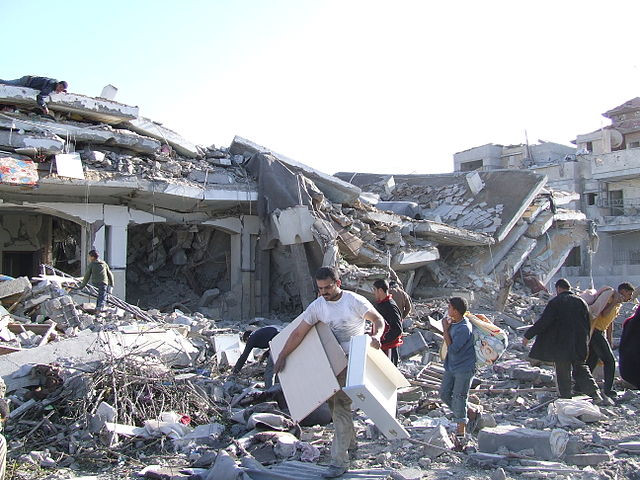As the conflict in Gaza continues to escalate, Israeli forces have intensified their operations in the northern part of the Strip, focusing on hospitals and shelters where civilians have taken refuge. On Monday, Israeli military actions surrounded critical hospitals and prevented crucial aid from reaching those in need, according to residents and medical personnel in Gaza.
Hospitals in the northern Gaza Strip, including Al-Awda, Indonesian, and Kamal Adwan hospitals, have become the epicenter of a humanitarian crisis. Médecins Sans Frontières (MSF), also known as Doctors Without Borders, reported that more than 350 patients, including pregnant women and post-surgery individuals, are trapped in these hospitals as Israeli forces continue to surround the area. "The water supply has been cut off for patients and staff at the Indonesian Hospital," said Hadeel Obeid, a chief nurse at the hospital. "They need permission from the [Israeli Defense Forces] to operate the electric generator, and there is no food due to the ongoing siege for the fourth consecutive day."
The health crisis is compounded by the refusal of medical staff to abandon patients, despite repeated evacuation orders from the Israeli Defense Forces (IDF). "We are implementing a priority treatment method for patients. This is the reality," said Hussam Abu Safiya, director of Kamal Adwan Hospital, adding that at least two critically ill patients in the intensive care unit had died due to a lack of medical supplies.
The United Nations Relief and Works Agency for Palestine Refugees (UNRWA) and other international organizations have warned that critical aid is being blocked from reaching northern Gaza. "People attempting to flee are getting killed, their bodies left on the street," said Philippe Lazzarini, head of UNRWA, in a statement. The U.N. Human Rights Office accused Israeli forces of unlawful interference with humanitarian assistance and of forcing displacement that could lead to the destruction of the Palestinian population in Gaza's northernmost region.
The Israeli military, however, has defended its operations, claiming that Hamas fighters are using hospitals and civilian areas as shields. In a statement, the IDF asserted that it has provided safe evacuation routes for civilians and facilitated the movement of medical supplies. But Palestinian health officials and aid organizations argue that no aid has successfully reached hospitals in the active conflict zones.
Troops have reportedly tightened their siege on Jabalia, Beit Hanoun, and Beit Lahiya, positioning tanks around these towns and issuing orders for residents to leave. In Jabalia, an Israeli airstrike on Monday killed at least five people, with several others wounded, according to medics on the scene. Residents describe dire conditions, with Raed, a resident of Jabalia, saying, "We are facing death by bombs, by thirst and hunger. Jabalia is being wiped out, and there is no witness to the crime, the world is blinding its eyes."
The hospitals that remain operational are struggling to function under relentless bombardment. At Kamal Adwan Hospital, medical staff say they have run out of basic supplies like sterile gauze, food, and even milk for children. "Mothers have to mix starch and flour with water and sugar to feed their children," said Dr. Eid Al Sabah, director of nursing at the hospital. Staff members are using tent cloth and furniture scraps for fires due to the ongoing fuel crisis, highlighting the desperation faced by those trapped.
In addition to targeting medical facilities, Israeli forces have rounded up men at shelters and ordered women to leave. Medics at the Indonesian Hospital reported that Israeli troops stormed a school and detained men before setting it ablaze, causing the fire to spread and lead to a power outage at the hospital. The IDF maintains that its forces are acting to dismantle Hamas infrastructure, including tunnels and alleged militant positions.
The international community has been vocal in its concern over the deteriorating humanitarian situation in Gaza. Last week, the United States called on Israel to improve the humanitarian conditions in Gaza or face potential restrictions on U.S. military aid. UNRWA reported that their shelters are now so overcrowded that some displaced people are being forced to live in toilets. "Hospitals have been hit and are left without power while injured people are left without care," Lazzarini stated, calling the ongoing actions "a sign of how low the moral compass is." He added, "Denying and weaponizing humanitarian assistance to achieve military purposes is unacceptable. A ceasefire is the beginning to putting an end to this endless nightmare."
Meanwhile, Israeli officials have denied that humanitarian aid is being withheld, pointing to images of trucks at border crossings filled with supplies waiting to be distributed. Despite these claims, Palestinian residents and aid groups assert that very little of the promised aid has reached those in the most desperate need, particularly in the northern regions under siege.
The conflict has already left more than 42,500 Palestinians dead, with another 10,000 believed to be buried under rubble, according to Gaza health authorities. In addition to those trapped in hospitals, tens of thousands of civilians are displaced, hungry, and cut off from any form of aid. The conflict has shown no signs of abating, as both sides continue their military operations. Israeli forces insist that their actions are aimed at eliminating Hamas, while Hamas accuses Israel of engaging in acts of genocide and ethnic cleansing.




